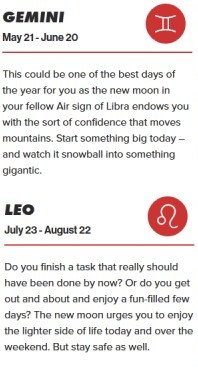 f late I've discovered that the horoscope is by far the most accurate section of the
newspaper. Unlike news reports, horoscopes are vague enough to be occasionally true,
the accuracy of a claim being inversely proportional to its specificity.
f late I've discovered that the horoscope is by far the most accurate section of the
newspaper. Unlike news reports, horoscopes are vague enough to be occasionally true,
the accuracy of a claim being inversely proportional to its specificity.
Astronomers tell us that due to precession, the horoscopes are now off by two months, so predictions for, say, Gemini, actually pertain to Leo. And that's lucky because something big will snowball last Friday for Geminis, while Leos should forget about work and go outside and enjoy the sunshine.

Horoscopes for Oct 16, 2020 from the New York Post. Leo is admonished for not going out in the sunshine, but in fact they should have started something big. Oh well, too late now
Whether there's any merit to the idea that the state of the universe at any given time influences our personality, and whether astrologers can interpret it correctly, are two separate questions. As with any other conspiracy theory, we must dismiss it for what it actually says, not what we imagine it says, or it will keep coming back.
I bring this up as an example of something that's generally believed to be false, yet Twitter and Facebook don't censor it, because censoring it provides no benefit to them. It's not about truth. They only censor opinions when doing so gives them a political benefit.
Facemasks
For whatever reason, facemasks have now become political. Twitter and Facebook have crossed a big red line: they are now censoring scientific opinions that they decide are false, including those of Dr. Scott Atlas, who cited the the CDC, the editor of the British Medical Journal, and the World Health Organization as saying that masks are ineffectual against SARS-CoV-2.
I have no opinion on facemasks, though like many of my colleagues I make my point in small ways. I carry a 12-inch ruler around with me to make sure everyone stays at least seventy-one and fifteen sixteenths inches away from me. It makes my point: our knowledge about this virus is inexact. But the censorship of scientific opinions is no joke. Until recently, they've mainly censored people for expressing support for President Trump or for criticizing Democrats. It's been pure partisan politics. Emboldened by the inability or unwillingness of their opponents to push back, they've now anointed themselves as arbiters of scientific truth.
At heart, politicization, no matter where it comes from, is a type of authoritarianism. It assumes there is one person who has access to the truth, and condemns those who disagree as heretics. Even some scientific magazines contribute to this by demonizing some ideas, calling them conspiracy theories, while supporting others that are just as shaky.
Suppressing debate, even when it's covered by the fig leaf of an algorithm, cannot bring us closer to the truth. Its only effect is to turn a conspiracy theory into a genuine conspiracy. Those who had been ridiculed for claiming that a conspiracy existed can then legitimately claim that they were right, and they will invent even more outlandish theories. Some bloggers, for example, insist that SARS-CoV-2 does not exist at all. If truth or falsity are decided by authority, who can say they're wrong?
Conspiracy theorists love censorship because it convinces people that authority is what decides truth. So all they have to do is adopt an air of authority, and people will believe them.
People are obviously afraid of this virus. In times of fear, humans turn to authoritarianism for safety. And maybe Facebook has an excuse: they're under strong pressure from big corporations to censor their content. But doing so turns a scientific question into a political one. Politicizing science undermines the public's confidence that science is fact-based and open to reason and counter-argument. It deprives laymen of the chance to understand why some things are true and others are not. And it prevents vital information from flowing from scientists to the public.
There are things out there much worse than COVID-19. By blocking public debate on this topic, Twitter may think they're doing a public service, but they are corrupting the flow of information that is as essential to science as to public health. This has to stop.
oct 19 2020, 5:46 am. edited for brevity oct 20 2020, 4:39 am
